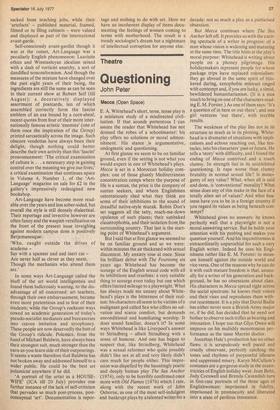Theatre
Questioning
John Peter
Mecca (Open Space) E. A. Whitehead's short, terse, tense play is a miniature study of a misdirected civilisation. If that sounds portentous I can assure the reader that Whitehead has not donned the robes of a schoolmaster: his play offers no solutions or moral admonishment. His stance is argumentative, undogmatic and questioning.
At first glance we seem to be on familiar ground, even if the setting is not what you would expect in one of Whitehead's plays. Mecca is set in a Moroccan holiday complex: one of those ghastly Mediterranean concentration camps where the purpose of life is a suntan, the price is the company of suntan seekers, and where Englishmen ostentatiously shed what they think are some of their inhibitions to the sound of dreadful native-style muzak. Robin Don's set suggests all the tatty, reach-me-down opulence of such places; their sunbaked claustrophobia, and their isolation from, the surrounding country. That last is the starting point of Whitehead's argument, But I said that at first glance we seemed to be on familiar ground and so we were: within minutes the air thickened with sexual discontent, My anxiety rose at once. Since his brilliant debut with The Foursome_ six years ago Whitehead has become the scourge of the English sexual code with all its inhibitions and cruelties: a very suitable thing to scourge even today but one which offers limited mileage to a playwright. What has always made me uneasy about Whitehead's plays is the bitterness of their realism: his characters all seem to be victims of a malignant god called Sex who offers no salvation and scarce comfort, but demands unconditional and humiliating worship. It does sound familiar, doesn't it? In some ways Whitehead is like Liverpool's answer to Strindberg — albeit Strindberg with a sense of humour. And one has begun to suspect that, like Strindberg, Whitehead was a sexual reformer who quite possibly didn't like sex at all and very likely didn't care much for people either. This impression was dispelled by the hauntingly poetic and deeply human play The Sea Anchor (1974), only to be horribly confirmed once more with Old Flames (1976) which I rate, along with the recent work of John Osborne, as one of the most self-indulgent and bankrupt plays by a talented writer for a decade: not so much a play as a publicised obsession.
But Mecca continues where The Sea Anchor left off. It provides us with the exciting spectacle of a writer in progress: of a man whose vision is widening and maturing at the same time. The title hints at the play's moral purpose: Whitehead is writing about people on a phoney pilgrimage. His holidaymakers represent people for whom package trips have replaced colonialism: they go abroad in the same spirit of blinkered daring, xenophobic mistrust tinged with contempt and, if you are lucky, a timid, bewildered humanitarianism. (It is a nice touch to bring on one of the characters reading E. M. Forster.) As one of them says: 'It's a question of in here or out there'; and one girl ventures 'out there', with terrible results.
The weakness of the play lies not in its structure so much as in its plotting. Whitehead is a dramatist of situations with implications and echoes reaching out, like tentacles, into his characters' past or future. He tells a 'story' with difficulty, and I found the ending of Mecca contrived and a touch clumsy. Its strength lies' in its uninhibited questioning. Is rape worse than clumsy brutality in normal sexual life? Is monogamy of any value? What, when all is said and done, is 'conventional' morality? What sense does any of this make in the face of a totally alien set of values? And what business have you to be in a foreign country if you regard its values as being beneath contempt?
Whitehead gives no answers: he knows perfectly well that a playwright is not a moral answering service. But he holds your attention with his probing and makes you question yourself. And his inquisitiveness is extraordinarily unparochial for such a very English writer, Indeed he uses his Englishness rather like E, M. Forster: to measure himself against the outside world and vice versa, One of the reasons why he can do it with such mature freedom is that, unusually for a writer of his generation and background, he has no obsessions about class. His characters in Mecca spread right across the social spectrum: he knows their voices and their vices and reproduces them without resentment. It is a pity that David Bailie has either never seen a British Army major or, if he did, has decided that he need not bother to observe such trifles as bearing and intonation. I hope too that Glyn Owen will improve on his mulishly monotonous performance as the tame Marxist doctor.
Jonathan Hale's production has no other flaws: it is scrupulously well paced and cruelly observant, perfectly catching the tones and rhythms of purposeful idleness and suppressed misery. Karyn McCallum's costumes are a gorgeous study in the eccentricities of English holiday wear. Jean Boht, Judy Cornwell and Brenda Cavendish turn in first-rate portraits of the three ages of Englishwoman: imprisoned in fidelity, imprisoned in promiscuity and liberated into a state of perilous innocence.


































 Previous page
Previous page